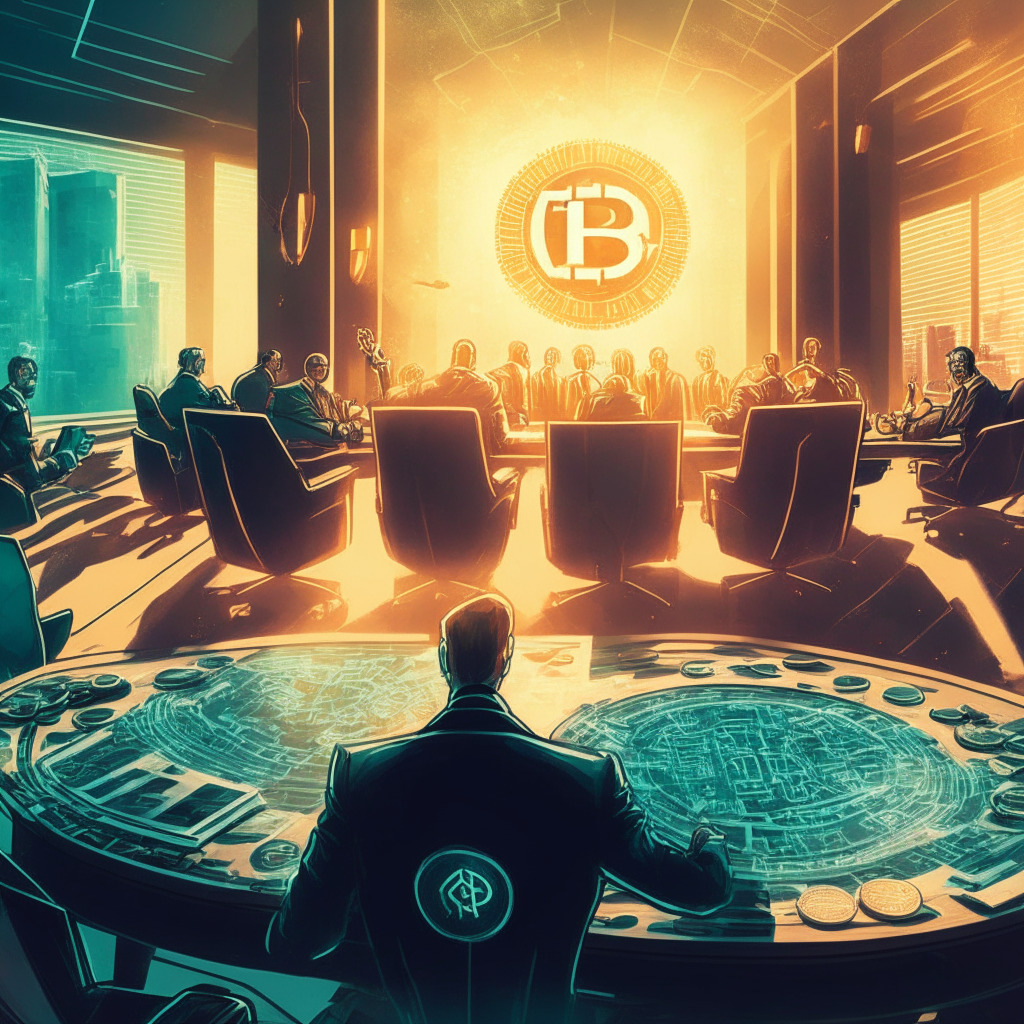“Bankman-Fried’s fraud trial connected to the FTX exchange collapse signifies a flip side to technological advancements in financial markets. The trial highlights the need for a balance between market freedom and regulatory oversight. As blockchain markets mature, increased regulation and oversight is expected.”
Search Results for: TT TECH Limited
Blockchain Technology’s Strength and Weakness: Navigating through Security Risks and Measures
“Despite the secure nature of blockchain technology, recent security breaches, particularly in nonfungible token platforms, have raised skepticism. While safety measures are intensifying, these incidents remind us that blockchain, while a fortress of safety, isn’t entirely immune to manipulation.”
Balancing Act: AI Deep Fakes, Celebrity Scams, and the Quest for Ethical Technology
“The growing trend of AI deep fakes, utilizing celebrities’ likeness without consent for scams or promotions, highlights the urgent need for regulations to balance AI evolution and public safety. However, it’s complicated to manage AI’s creative potential while respecting individual rights.”
Illegal Crypto Mining in Sarawak: A Double-Edged Sword of Technological Advancement and Risk
“Illegal crypto mining operations in the residential areas of Sarawak, Malaysia, have resulted in recurrent power disruptions. Investigations revealed 74 unauthorised cryptocurrency mining servers connected to direct tapping cables, risking short circuits, fires, and even loss of life. Unrecorded consumption caused substantial economic damage, prompting utility firms, police, and anti-corruption agencies to develop new electricity theft detection methods.”
KBank’s $100 Million Fund: A Leap into the AI, Web3, and Global Fintech Future or Risky Business?
Thailand’s Kasikornbank (KBank) has launched a $100 million fund targeting Artificial Intelligence (AI), Web3, and global fintech startups. With backing from the Bank of Thailand, the fund aims to drive global innovators to advance finance in the APAC region.
Portrait of Legal Challenges and Tech Advancements in Crypto Space: The FTX Boss and SEC’s AI Integration
Former FTX boss, Sam Bankman-Fried, faced legal complications over his request for temporary release, highlighting challenges in the technological logistics of preparing for trial with limited internet access in prison. Conversely, SEC Chair, Gary Gensler, revealed the agency’s use of AI for financial scrutiny, stirring both excitement and skepticism around potential benefits and concerns such as data privacy and transparency.
Digital Justice served Cold: Concern Over FTX Founder’s Limited Internet Access During Trial
“The case of FTX founder Sam Bankman-Fried, involving complications related to digital access for legal defense, questions traditional understanding of a fair hearing. Limited internet access and slow speeds have affected defense preparation, raising concerns about potential infringement on the right to a fair trial.”
Untapped Potential of Web3: A Venture of Tech Innovation and Hesitant Adoption
Brands like Nike and Adidas have begun integrating blockchain technology into loyalty programs. However, the majority of businesses are moving cautiously amidst fluctuating crypto markets and inflation concerns. Web3’s potential remains largely untapped due to slow consumer adoption, with its use still considered an “edge case” for most marketers.
Cross-Chain Metamask Snaps: A Boon for Wallet Technology or a User Experience Nightmare?
MetaMask Snaps, a new plugin by Consensys, will allow different blockchain networks like Bitcoin and Solana to interact directly with the MetaMask wallet to facilitate transaction signing and smart contract understanding. However, concerns around user-friendliness, security checks, and notification inundation need to be addressed.
Legal Fairness vs. Technological Demands: Insights from a Crypto CEO’s Confinement
The former FTX CEO, Sam Bankman-Fried, has found himself in legal troubles again. His defense team claims that limited internet access and subpar laptop technology at the detention center are impeding their preparation for the upcoming trial in October.
Former FTX CEO’s Regulatory Battle: Technology Access vs Alleged Misuse
Sam Bankman-Fried, former CEO of FTX crypto exchange, faces ongoing legal issues and his case highlights the conundrum of the digital currency world. Regulating sophisticated access to technology, particularly when allegations of misuse arise, proves to be a crucial element in this industry.
Crypto Safety Compromised: Debating the Fallout of FTX Exchange Shutdown and Rising Phishing Attacks
After a major exchange shutdown, customers of FTX are still facing issues including a fresh phishing attack that targets their emails. In a SIM swapping attack, customer information from FTX, Genesis, and Blockfi were compromised. A dubious proposal claiming to recuperate lost capital asked customers to link a crypto wallet to their account, potentially risking a complete drain of token holdings.
Surge in Blockchain Betting Forecasts a Potential Dark Horse in 2024 Presidential Race
“Bitcoin-friendly entrepreneur Vivek Ramaswamy emerges as a formidable contender in the 2024 U.S. Republican presidential nomination. Blockchain-based betting platforms indicate his growing popularity, signifying possible cryptocurrency and blockchain acceptance in political scenarios. Though legally limited, this technology may revolutionize gauging public sentiment.”
Nova Labs’ Disruptive $5 Month Phone Plan: A Revolutionary Bet on Blockchain and 5G Technology
Nova Labs, a blockchain startup, revealed plans for a $5 monthly phone plan using 5G hotspots owned by individuals and businesses. This service aims to disrupt the telecom industry, supported by the startup’s Helium Network which rewards hotspot owners with crypto tokens for data provided to customers.
Centralization vs Decentralization: The Battle for our Digital Existence
“In an era where digital advancement accelerates, centralized platforms like Twitter, now “X”, threaten user safety, privacy, and control. They replicate China’s WeChat convenience, but also its control over autonomy and data. However, blockchain and cryptography offer routes towards decentralized, user-controlled digital existence.”
Battle of the Meme Tokens: PEPE Faces Downturn While Shibie Gains Traction
“Despite a downward trend, PepePepecoin (PEPE) shows a glimmer of respite in its technical indicators with RSI signalling oversold. However, Shibie, a token combining Shiba Inu and Barbie, offers a promising alternative with aggressive marketing and fluid trading conditions, aiming to challenge leading crypto figures.”
FCA’s Sandbox: An Innovation Playground or a Risky Experiment for Blockchain Technology?
The U.K. Financial Conduct Authority is offering firms access to a digital sandbox for testing their products’ early-stage performance. The sandbox provides datasets, APIs, and data security protection. This initiative helps firms evaluate products, supports various digital-asset use cases and fosters an ecosystem of integration within the digital economy. The sandbox’s broader availability piques crypto enthusiasts’ interest, prompting discussions around blockchain technology’s future.
Bolstering Blockchain: The Integration of ZK Proofs in Cryptographic Technologies
This article discusses the partnership between Paris-based =nil; Foundation and Fabric Cryptography as they work together to enhance cryptographic technologies and accelerate the deployment of zero-knowledge (ZK) proofs – a cryptographic procedure with substantial privacy-preserving attributes. They aim to overcome barriers in computation, making ZK proofs more functional for digital transactions, cloud services and privacy applications.
Twitter’s Rate Limitations: The Impact on Crypto Communities and the Emergence of Decentralized Alternatives
“Twitter’s decision to place severe rate limits has led to a significant limit on shared information. Reports indicate a drop of over 60% in the number of tweets indexed by Google. This change has consequences for industries, especially cryptocurrency, as Twitter is used heavily for information dispersion. Decentralized Twitter rival, Mastodon, is seeing unprecedented growth, while Twitter competitor, Threads, prepares for launch.”
Ark vs BlackRock: Battle for the First Spot-Bitcoin ETF Approval Heating Up
ARK Investment Management believes it has secured frontrunner status for spot-Bitcoin ETF approval, despite BlackRock leading the race. USDC CEO Jeremy Allaire mentioned well-regulated custody infrastructures, mature spot markets, and effective market surveillance as factors supporting potential approval.
Exploring the Digital Pound: Ledger Technologies, Privacy, and Public-Private Collaboration
The Bank of England is progressing with its Central Bank Digital Currency initiative, exploring multiple ledger technologies including blockchain for the digital pound. The privacy-focused design prioritizes user privacy and involves collaboration between public and private sectors, highlighting the importance of evolving financial landscape and global shift towards digital currencies.
Gutter Cat Gang, Puma, and LaMelo Ball: NFT Sneaker Collection Sparks Debate
Gutter Cat Gang has partnered with Puma and NBA player LaMelo Ball to launch the “GutterMelo MB.03” NFT sneaker collection, set to hit the market on June 29. Every buyer will also receive a physical counterpart, increasing mainstream awareness of web3 technology and digital collectibles, while raising questions about accessibility and exclusivity in digital fashion.
Binance Integrates Bitcoin Lightning Network: Boost for Faster Transactions or Limited Adoption?
Binance plans to integrate the Bitcoin Lightning Network for faster, cheaper transactions, addressing scalability issues. Despite its potential, the Lightning Network’s liquidity is less than 0.5% of Ether locked in DeFi contracts, raising questions about mainstream adoption and its impact on cryptocurrencies and cross-border payments.
Binance Battles Fake Affiliates and Global Regulatory Pressure: Finding the Balance
Binance issued a cease and desist notice to a fraudulent company, “Binance Nigeria Limited,” which solicited Nigerian investors without proper registration. As Binance faces increasing global regulatory pressures, this incident highlights the importance of vigilance and staying up-to-date on blockchain developments.
Polygon 2.0: Unleashing Unlimited Scalability and Bridging Crypto’s Gaps in a Troubled Market
Polygon 2.0, an Ethereum-based Layer-2 scalability solution, aspires to democratize the global economy by creating a user-centric, equitable internet experience. However, uncertainty looms due to the SEC ruling on its native cryptocurrency, MATIC. The new iteration focuses on unification, infinite scalability, and leveraging Zero-Knowledge technology for seamless interaction.
The Arrival of Polygon 2.0: Transforming Internet & Blockchain with ZK Technology
Polygon Labs announces “Polygon 2.0,” a set of upgrades designed to establish the “Value Layer” of the internet, enabling users to create, exchange, and program value online. Powered by Zero-Knowledge (ZK) technology, Polygon 2.0 aims to support limitless chains and seamless cross-chain interactions, potentially transforming internet use and blockchain integration while facing regulatory challenges.
UK Secures Early Access to AI Models: Impact on Global Tech Race and Crypto Regulations
The UK is set to receive early access to AI models from Google DeepMind, OpenAI, and Anthropic, as announced by British Prime Minister Rishi Sunak. This move aims to foster cutting-edge safety research, promote global alliance, and invest in AI and quantum technologies, potentially providing the UK with a competitive edge in AI innovation.
ConsenSys Legal Battle: Shareholder Vote, Corporate Maneuvering, and Decentralization Dilemma
The legal battle between ConsenSys and 35 former employees over allegations of transferring core assets and devaluing shares has broader implications for the essence of blockchain technology and highlights the challenges crypto companies face balancing decentralization and corporate maneuvering.
NFT Battle in UK Album Charts: Gallagher vs. Foo Fighters & The Future of Music Industry
In a race to top the Official UK Album Charts, Noel Gallagher collaborates with Web3 startup Serenade to create a limited-edition NFT pressing of his album “Council Skies.” The NFT offers high-quality WAV files, a documentary on the album’s making, and signed artwork, reflecting the growing value and versatility of NFTs in the music industry.
Luxury NFTs: Louis Vuitton’s Soul-Bound Collectibles Challenge Ownership Dynamics
Louis Vuitton launches a limited edition NFT collection called “Treasure Trunk,” featuring strict rules prohibiting resale. This unique approach aims to encourage loyalty and prevent dilution of luxury status, yet raises questions about true embrace of NFT technology and market ethos.
Louis Vuitton’s $41K NFT Treasure Trunks: Luxury Exclusivity vs Blockchain’s Inclusive Potential
Louis Vuitton is launching “Treasure Trunks,” a limited series of soulbound NFTs priced at $41,712, offering unique products and experiences for high-level clientele. The collection is part of the ongoing “Via” program, which focuses on exclusive access for high-spending customers. This trend raises questions on whether luxury brands are embracing blockchain’s true potential or catering only to the elite.
Apple Vision Pro: Revolutionizing Tech or Just Hype? Pros, Cons & Metaverse Impact
Apple’s Vision Pro, an augmented reality headset, marks the beginning of spatial computing, immersing users in digital surroundings and transforming physical spaces. Despite its potential to revolutionize technology interaction, questions remain on its promised capabilities, developer adoption, and impact on society due to its hefty price tag.































